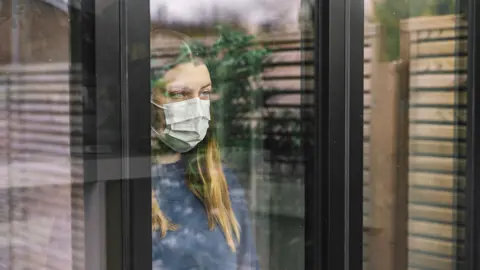Covid-19 pandemic likely have 'profound' effect on mental health
 Getty Images
Getty ImagesMental health problems associated with the Covid-19 pandemic are "likely to be profound and felt for many years".
That is according to a newly-published research paper on suicide from the Northern Ireland Assembly.
It said there was "emerging" evidence the mental health of younger people in particular had been "disproportionately affected".
The paper warned, though, conflating declining mental health with suicide and suicide risk should be avoided.
It said to do so could increase the risk of normalising suicidal behaviour.
 Getty Images
Getty ImagesThe paper, produced by the assembly's research and information service, said the "increased mental health burden associated with the Covid-19 pandemic is likely to be profound and felt for many years".
"Restrictive measures put in place during the pandemic coupled with, for example, loneliness, job and income loss, bereavement, and the direct or indirect impacts of Covid-19 has led to increased levels of anxiety and had a negative effect on many people's mental health," it said.
"The pandemic has also been shown to affect subsections of the population differently, for example, front-line workers, those hospitalised by Covid or suffering post-infection, and those with fewer social or economic resources.
"There is also evidence emerging that the mental health of younger people in particular has been disproportionately affected."
Recent research has suggested that anxiety and depression is more common in children and young people in Northern Ireland compared to other parts of the UK.
A number of experts have also previously warned of the impact of the pandemic on children.
In 2020, 13,348 referrals were made to Child and Adolescent Mental Health (CAMHS) services in Northern Ireland.
However, monthly figures released by the Department of Health (DoH) in response to an assembly question from the People Before Profit MLA Gerry Carroll show that referrals fell sharply in the first months of lockdown from March to May.
There were 470 referrals to CAMHS in April 2020 and 618 in May 2020, for instance, compared to 1,474 in February 2020 and 1,636 in January 2020.
By September 2020, referrals had risen again to 1,508.
 Getty Images
Getty ImagesThere have been separate previous warnings that child protection referrals also initially fell in lockdown.
The paper said that spending on mental health care in Northern Ireland remained the lowest in the UK "estimated to be around 7% of the total healthcare budget".
"According to the Department of Health (NI), this is 27% less than the mental health budget in England and 20% less than in Ireland," it said.
On suicide, the research paper said that the circumstances which may lead a person to take their own life were "complex and unique."
It also said there should be caution in conflating poor mental health and suicide risk, and that there was a wide range of support for those who felt suicidal.
It said one of the first steps was to encourage people to talk about how they felt, and said family or friends, GPs or confidential services like Samaritans or Lifeline could then offer support.
 Getty Images
Getty ImagesHowever, the paper noted that the pandemic has "raised concerns about the potential impact on suicide rates".
"Provisional suicide data released from the Northern Ireland Statistics and Research Agency (Nisra) in March 2021 shows an increase of 33.5% in suicide deaths between 2019 and 2020," it said.
The provisional data from Nisra shows 263 suicides in 2020 compared to 197 in 2019.
"However, given delays in registration processes, not all deaths recorded in 2020 will have occurred within the pandemic period," the paper said.
"Moreover, it will be some time yet before a more complete picture emerges."
Funding constraints a 'significant challenge'
It said that about 70% of people who die by suicide in Northern Ireland were not previously known to mental health services.
The paper also warns "funding constraints remain a significant challenge" to the implementation of Protect Life 2 - the suicide prevention strategy for Northern Ireland.
"Suicide has a devastating impact on families, communities and society as a whole," the paper concludes.
"Yet with timely and appropriate support, people can get through a suicidal crisis and recover."
If you have been affected by any of the issues in this article, there are a list of organisations that may be able to help at BBC Action Line.
